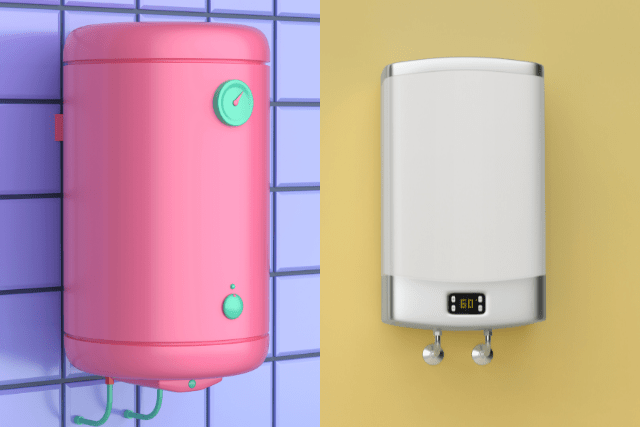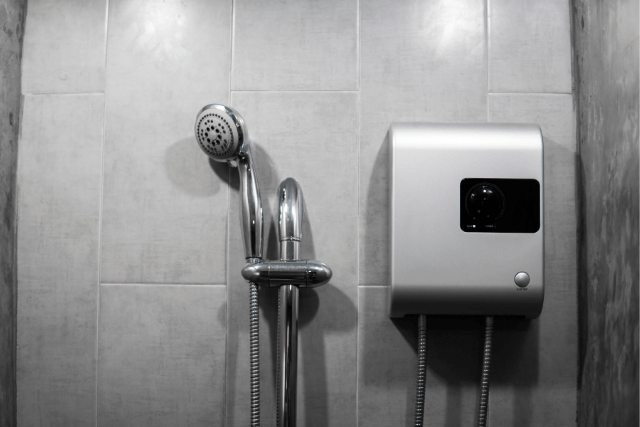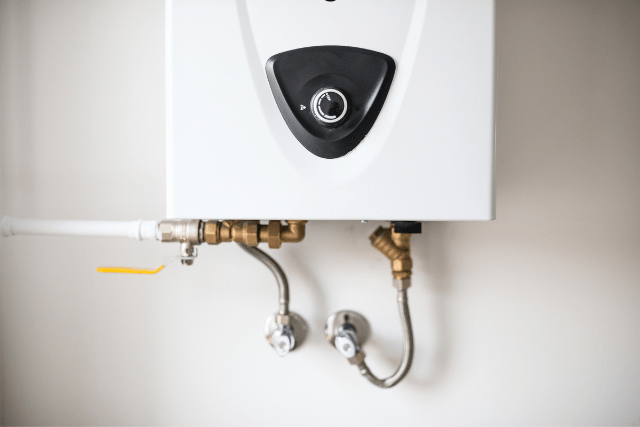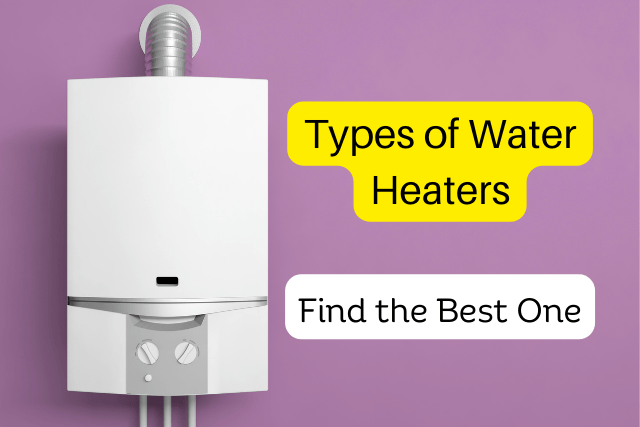Whether it’s an early morning shower to start the day or a relaxing hot bath to wind down at night, having a reliable water heater in your bathroom is essential. But with many types available on the market, choosing the perfect water heater that meets your needs can be daunting. The options are plenty, from tankless water heaters that provide instant hot water and storage heaters that ensure a steady supply to energy-efficient solar and heat pump variants.
In this guide, we dive into the different types of water heaters, exploring their features, pros, and cons to help you make an informed decision. Whether you’re looking for energy efficiency, cost-effectiveness, or compactness, we have something to suit every bathroom need.
Different Types of Water Heaters
Many different types of water heaters are available on the market, each with its benefits. Here is a rundown of some of the most popular options to help you decide which one is the best water heater for the bathroom:
1. Storage Water Heaters
These are the most common types of water heaters, and they work by storing hot water in a tank. They are typically less expensive than other types of water heaters, and they are easy to install. However, they can be less energy-efficient since they store hot water in a tank, which can heat up and cool down over time.

Pros:
Their ability to supply hot water for multiple outlets simultaneously and their lower initial cost make them a popular choice for many households.
Cons:
However, their standby energy consumption is higher because they always keep the water hot. Moreover, once the stored hot water is depleted, you must wait for the tank to heat up again.
2. Tankless Water Heaters
Tankless water heaters are water heaters that do not store hot water in a tank. Rather, they heat water on demand. Tankless water heaters are more expensive than traditional water heaters but are more efficient and have a longer lifespan. Tankless water heaters are a good choice for small homes or people who use hot water.

Pros:
These heaters are energy-efficient as they only heat water when needed, reducing the standby energy losses associated with storage water heaters. They also provide a constant hot water supply, perfect for large families.
Cons:
However, they often can’t supply enough hot water for simultaneous uses in large households. Moreover, they have a higher upfront cost.
3. Solar Water Heaters
Solar water heaters use the sun to heat a water tank for your home. Solar water heaters are a great choice for those looking to save money on their energy bill. Solar water heaters can heat a water tank for your home without electricity by harnessing the sun’s power.
There are two types of solar water heaters: active and passive. Active solar heaters use pumps and controllers to circulate water, while passive ones rely on natural convection.
Solar water heaters are also environmentally friendly, as they don’t produce any emissions or pollutants. There are a few things to keep in mind when considering a solar water heater, such as the size of your home and the climate you live in, but overall, they are a great option for those looking to save money and go green.
Pros:
They can significantly reduce energy bills, have a long lifespan, and are perfect for locations with abundant sunshine.
Cons:
Their installation cost is high, and they may require a backup system for cloudy days or high-demand periods.
4. Gas Water Heaters
A gas water heater may be the perfect fit if you’re seeking a cost-effective and efficient solution. Whether it’s a quick hot shower or a long relaxing bath, gas water heaters can provide endless hot water without significantly impacting your utility bills.

As the name suggests, gas water heaters are powered by natural gas or propane. They can be either tank-type or tankless models. The tank-type models store and heat a specific amount of water in a tank, ensuring hot water is ready for use anytime. On the other hand, tankless gas water heaters, also known as on-demand water heaters, heat water directly as it passes through the unit, eliminating the need for a storage tank.
Pros:
Gas heaters heat water faster than electric ones, which can be especially helpful for large families. Moreover, using gas for heating is usually cheaper than electricity, which can result in lower operational costs.
Cons:
However, they require proper ventilation to expel the exhaust gases, which may not be feasible in all homes.
5. Heat Pump Water Heaters
Also known as hybrid water heaters, heat pump water heaters operate on a simple principle: they extract heat from the surrounding air or ground and transfer it to the water in the tank. Unlike conventional water heaters, which generate heat directly to warm up water, heat pump water heaters move heat from one place to another, making them highly energy-efficient.
There are two types of heat pump water heaters: standalone (integrated) units and add-ons. Standalone units have the heat pump and water storage tank combined as a single unit, while add-on units can be added to an existing water heater to increase efficiency.
Pros:
They use less electricity than traditional electric heaters, making them energy-efficient. They can also cool and dehumidify the space where they are installed.
Cons:
They have a higher upfront cost, require a lot of space, and work best in warm climates.
Which type of water heater is best for the bathroom?
Many water heaters are on the market, but not all are created equal. When choosing a water heater for the bathroom, there are a few things to keep in mind.
Size of the bathroom.
A tankless water heater might be the best option for a small bathroom. They do not take up as much space as a traditional water heater. They can be mounted on the wall, so they will not take up valuable space in your bathroom. Another benefit of tankless water heaters is their endless hot water supply. This is perfect for taking long showers or filling up a bathtub.
How much hot water you will need?
If you have a large family or frequently entertain guests, you’ll need a unit that can handle a lot of demand. Otherwise, a smaller unit will suffice. tankless water heaters are a good option for those who need a lot of hot water, as they heat water on demand and don’t require a large tank. However, they’re more expensive than traditional tank heaters and may not suit everyone. Ultimately, choosing the right size unit for your needs is important to ensure you have enough hot water when you need it.
Energy Efficiency
Energy efficiency is a critical aspect to consider when choosing a water heater. Highly efficient water heaters can save a significant amount on your energy bills while also being environmentally friendly.
- Tankless water heaters are known for their high energy efficiency, as they only heat water on demand, reducing standby energy losses associated with storage water heaters.
- Gas water heaters can heat water faster than electric models, which might translate into energy savings.
- Solar water heaters and heat pump water heaters, although pricier initially, offer considerable energy savings over time as they utilize renewable resources (the sun and ambient heat, respectively).
Make sure to check the energy factor (EF) of the water heater, which indicates its energy efficiency. The higher the EF, the more efficient the heater is.
Installation Requirements
Consider the space and infrastructure required for installing different types of water heaters.
- Gas water heaters require proper ventilation and access to a gas line, which may limit where they can be installed.
- Solar water heaters require sufficient roof space that receives ample sunlight.
- Heat pump water heaters need considerable space and work best in warmer climates.
Climate and Geographical Location
The effectiveness of certain types of water heaters can depend on your geographical location and local climate.
- Solar water heaters are most effective in areas with abundant sunlight throughout the year.
- Heat pump water heaters work best in areas with moderate to hot climates as they extract heat from the air.
- Gas water heaters can work effectively in any climate, given natural gas or propane availability.
Consider your budget.
When you are considering your budget for a water heater, you need to take into account the initial cost as well as the long-term costs. For example, a tankless water heater may have a higher initial cost than a traditional one, but it will save you money on your energy bills in the long run. You also need to consider your household size and how much hot water you will use daily. A larger household will need a larger water heater.
Once you have considered your budget and needs, you can look at different types of water heaters to find the best one for your bathroom. An electric tankless water heater might be the best option if you have a small bathroom and don’t use much hot water. These heaters are very efficient and can save you money on energy bills in the long run.
Maintenance and Lifespan
Understanding the maintenance requirements and expected lifespan of different types of water heaters can also influence your decision.
- Maintenance Requirements: Certain water heaters, like tank-type models, require more regular maintenance, including flushing to remove sediment build-up. On the other hand, tankless water heaters usually require less maintenance.
- Lifespan: Different types of water heaters have varying lifespans. While traditional storage water heaters typically last 10-15 years, tankless models can last more than 20 years. Solar and heat pump water heaters have longer lifespans, often making them cost-effective despite their higher upfront costs.
Warranty
Before making a purchase, examine the warranty of the water heater. A longer warranty often suggests a better-quality unit that the manufacturer is willing to stand behind. Consider the length and coverage of the warranty, including whether it covers labor, parts, or the entire unit.
Brand Reputation and Reviews
Lastly, consider the brand’s reputation and read user reviews. This can give you insight into the reliability and performance of the water heaters and the quality of customer service the company provides.
Conclusion
Selecting the right water heater is an investment in your comfort. It’s a decision that should be made considering your daily hot water requirements, available space, climate, budget, and preference for energy efficiency. While a tankless heater can be great for small households with lower hot water demand, a large family might benefit from a consistent supply of storage heaters. Solar heaters or heat pumps are ideal for those seeking an eco-friendly and cost-effective solution, though they demand a higher initial investment.
So, arm yourself with this information, assess your needs, and make a choice that ensures a cozy and warm bathroom experience. Here’s to a future full of comforting hot showers and relaxing warm baths!
Frequently Asked Questions
Why is energy efficiency important when selecting a water heater?
Energy efficiency is critical as it directly impacts your energy bills and carbon footprint. Energy-efficient water heaters, like tankless, solar, and heat pump water heaters, utilize less energy to heat water, reducing energy consumption and contributing to environmental sustainability.
Are upfront costs or operational costs more important when considering the cost of a water heater?
Both upfront and operational costs are important and should be considered together. While traditional storage water heaters may have lower initial costs, their operational costs can be higher due to energy inefficiencies. On the other hand, tankless and solar water heaters may have a higher upfront cost but can save money in the long run due to lower operational costs.
How does the size and capacity of a water heater affect its performance?
The size and capacity of a water heater should match your household’s hot water demand. If the water heater is too small, it may not be able to meet peak hot water needs, leading to inconvenient shortages. Conversely, a water heater that’s too large for your needs can lead to unnecessary energy consumption.
How do installation requirements differ for various types of water heaters?
Different types of water heaters have distinct installation requirements. Gas water heaters require proper ventilation and a gas supply line. Solar water heaters need sufficient roof space for solar collectors and receive plenty of sunlight. Heat pump water heaters require much space and a warm environment for optimal performance.
How does the local climate influence the effectiveness of certain types of water heaters?
The local climate can significantly affect the efficiency of certain water heaters. Solar water heaters require abundant sunlight, making them most effective in sunny climates. Heat pump water heaters work best in moderate to hot climates as they extract heat from the air. Conversely, gas water heaters can operate efficiently in any climate, given the availability of a natural gas or propane supply.
Why is it important to consider the maintenance and lifespan of a water heater?
Understanding the maintenance requirements of a water heater can give you an idea of the ongoing effort and cost to keep the unit operating efficiently. Meanwhile, a water heater’s lifespan can impact your investment’s long-term cost-effectiveness. Longer-lasting models, like tankless or solar water heaters, may provide better value over time.
How can the brand reputation and user reviews influence my water heater selection?
A brand’s reputation can give insights into the quality and reliability of its water heaters. User reviews, on the other hand, can provide real-world insights into the performance and customer service associated with the product. Researching both aspects can help ensure you make an informed choice.
What is a condensing water heater?
Condensing water heaters are usually gas-powered and designed to conserve energy. They work by capturing hot exhaust gases that would typically be expelled from a home and utilizing this heat to warm up the water in the tank, reducing the amount of gas needed to reach the desired temperature.
What’s the difference between a storage and a tankless water heater?
The primary difference between these two heaters is how they store and heat water. A storage water heater stores and continually heat a large amount of water in a tank, ensuring hot water is always available. On the other hand, a tankless water heater heats water only when needed as it flows through the unit, resulting in potential energy savings since it doesn’t need to heat a tank of water continuously.
Are there water heaters that combine different technologies?
Yes, there are water heaters that combine different technologies to optimize efficiency. For example, hybrid heat pump water heaters use heat pump technology for heating water but also contain electric heating elements when the heat pump alone can’t satisfy the demand. Similarly, some solar water heaters have a gas or electric backup system for low solar availability.







